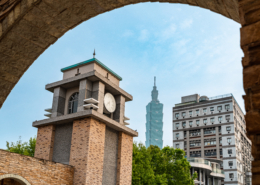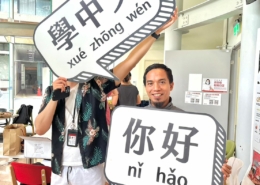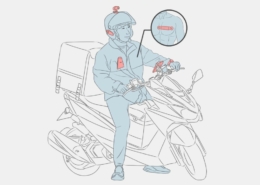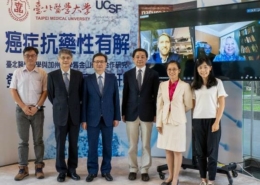Why Taiwan chose TMU to lead stem cell research
Prof. Rita Yen-Hua Huang and her students speak
“TMU leads the nation in systemic cell therapies and regenerative medicine,” Distinguished Professor Rita Yen-Hua Huang noted in a recent talk. As proof, the Center for Cell Therapy and Regeneration Medicine’s director noted that TMU triumphed over 20 universities to host the National Program for Regeneration Technology Development.
But pre-eminence doesn’t mean she’s working alone – the young center already cooperates with five U.S. universities and one U.S. company, four Taiwan companies, a Korean university and hospital, two top Japanese universities, and both Hong Kong University and the Duke University-National University of Singapore Medical School.
Prof. Huang’s presentation was occasioned by the visit of Stanford University-based stem cell pioneer Prof. Irving Weissman, who uses embryonic stem cells in some of his work. Because these cells come from fetal tissue donated through the U.S. Anatomical Gifts Act, certain religions also oppose this research, and government and universities are wary of supporting it.
In contrast, Taiwan has been free of opposition to cell therapies because the TMU lab uses mesenchymal and small blood stem cells, not embryonic stem cells. Prof. Huang said Taiwan’s government made a “top-down proposal” offering grants so Taiwan can develop this vital biotech area. TMU was ranked first of 21 applicants, and she anticipates renewal of the three-year Ministry of Science and Technology grant.
Although each six-month review has gone well, the best guarantee of this research continuing is a tangible, practical solution enabled by the lab’s research: “They want a product,” she said. A wound patch for the slow-healing skin sores that plague diabetics looks like one likely candidate, but the center is developing plenty of other ideas and moving them toward clinical trials.
These efforts have four supporting parts: university educational programs, TMU Hospital participation, animal labs for pre-clinical studies, and a Good Tissue Practice (GTP) cell culture laboratory that serves as the incubation center for clinical-grade cell preparation. GTP is an international standard for lab safety and quality, based on a 2005 U.S. law regulating use of human cells and tissues as well as products based on these. TMU pursues research into both stem cells and non-stem-cell immune therapies under these demanding conditions.
The lab’s work so far spans from basic research through pre-clinical animal studies, with a triple focus on 1) stem cells and regenerative medicine, 2) use of these techniques in translational medicine, and 3) development of ethical outreach and educational services for industry and society. The translational focus combines the work of doctors, scientists and businesses to find safe and effective new techniques that address unmet medical needs.
Beyond ‘bench to bedside’
Prof. Huang expands the traditional “bench to bedside” model as “3B+E”: bench, bedside, business, and education. For the “bench” or basic research, she says the center’s main efforts are in studying niche and embryonic pluripotency (niche hypoxia and inflammation), stem cell immune modulation and epigenetics, and nanodrug and cancer stemness.
The “bedside” or clinical promise is pursued through preclinical studies in which mesenchymal stem cells and small blood stem cells as well as immune-related mechanisms (natural killer cells, T cells, CAR-T) are being used to treat cancer, decubitus ulcers (bedsores), severe burns and multiple sclerosis. The center’s innovations that have moved closest to clinical trial stage involve guided bone regeneration in implant surgery using small blood cells, and a patch to heal diabetic foot ulcers that involves both small blood cells and mesenchymal cells.
Taiwan’s Food and Drug Administration is reviewing a strategy that uses small blood cells in dental implants, which Prof. Huang says is very promising for Taiwan’s aging society, noting that many elderly people endure the discomforts of dentures.
The field is very young – only 55 cell therapy products have been approved on world markets, she said, with Japan providing 4 and the US more than 20. Different countries have different regulations, and to protect patient safety Taiwan is fairly conservative compared with the global spectrum, so the TMU team is awaiting permission to progress to Phase 2 and 3 trials. Although they cannot patent the cell components, the delivery systems are patentable, so the team is perfecting the sheets and glue used in the wound-healing patches.
TMU’s GTP lab allows businesses to rent space alongside scientists to develop products in a safe and government-approved environment. Prof. Rita said the lab has received a good level of interest from the commercial sector. It also offers TMU’s affiliated hospitals and doctors support in developing their research.
Of two immune-based cancer therapies under development, one uses natural killer cells, a non-stem cell, and is in Phase 1 trials. The current three-year grant will cover finishing this phase next year, with the next phase tentatively scheduled for 2019. If this goes well, it will be offered for industrial development to support the costs of Phase 3 testing. The principal investigator retains ownership of the patent on behalf of the research team, so industrial development does not mean that TMU says goodbye to the positive outcomes of this research, including profits.
The educational mission
Prof. Huang said it is unusual for students to be involved in such research, but she has company in that assessment: Prof. Weissman called TMU’s MD/MS program “unusual and exciting” because it combines clinical and research components, allowing medical students to study cell therapies and product quality control.
The center also recruits degree students for the International PhD Program for Cell Therapy and Regeneration Medicine worldwide: these students often have professional experience with industry or research in their home countries.
Another proposal will help the lab provide general education programs for patients and others if it is funded by the Ministry of Education. TMU undergraduates already can take elective courses to learn more about this new field, and the degree program has more than doubled its enrollment in its first two years. These students are investing in a research degree, and three students who accompanied Prof. Huang to a recent interview were clearly aware that this new field is different from traditional pharmaceutical research.
Scott Yi-Heng Lin has been in the cell therapies master’s degree program since its initial year. He said pharmaceutical companies cannot commercialize these therapies as drugs – after all, they are “personalized medicine” tailored to each individual case, not administered as factory-manufactured standard doses. This means researchers must rely on other funding sources.
First-year student Ngo Thi Mai Huong agreed that it’s hard to get research money from pharmaceutical companies for these topics, like her studies of pathways and resistance in liver cancer. Ms. Huong has a deep background in research, with a decade of lab experience in Ho Chi Minh City and Haiphong in her native Vietnam, most recently studying in-vitro fertilization.
Another first-year student, Ageng Brahmadhi, went further to say that not only is each case unlikely to yield profit, but for now at least, these techniques are still “cost-consuming.” Thus he said that the issue isn’t pharma acceptance yet, but instead proving safety and efficacy so that companies will be willing to develop cell therapies on a larger scale. “First we must translate safety; safety is the biggest consideration,” he said. “Getting industry money is still far in the future, after many more stages. For now, the research relies on government funding.”
Mr. Brahamadhi was recruited from Universitas Muhammadiyah Purnokerto in central Java, with a background in medicine as well as histology and cell biology. He is working on DNA methylation, looking for biomarkers that will be useful in cell therapy.
Indonesia is another context for stem cell controversies, with cell therapies being pursued seriously by only two big hospitals in Jakarta and Surabaya. However, he said that private clinics promote scams that are marketed as stem cell therapies, based on myths that need to be countered by education for both patients and clinicians. Part of the problem is that few Indonesian-language publications cover this new field, and because most doctors do not study English in medical schools, they are cut off from international scholarly journals.
Dr. Lin has been working on finding mechanisms of acquired resistance in cancer biology, hoping to understand how this works and is overcome. He said that the dual-degree program could be pursued at various points during medical studies, with students generally starting their research in their fifth year and completing the degree in the sixth. But he advised students to start earlier, perhaps even in their first and second years, saying the earlier these students can get into research, the more time they can spend on this, because the medical school curriculum becomes more demanding as the years pass: “There are so many other things to do.”
He knows this first-hand, because he entered the program after receiving his MD degree. After seeing heartbreaking critical care cases where “there’s really nothing more we can do for the patient,” the promise of using cell therapies to address these medical challenges makes the program rewarding.
He says that addressing problems like a scientist rather than a clinician helps him to “think logically and critically” rather than applying received protocols and care standards, as physicians do. “The program is more structured and evidence-based [than medical school], and we learn skills and techniques” that doctors don’t encounter. For these reasons, Dr. Lin praised the TMU MD-MS option as “a really good combination.”
For interviews or a copy of the paper, contact Office of Global Engagement via global.initiatives@tmu.edu.tw.

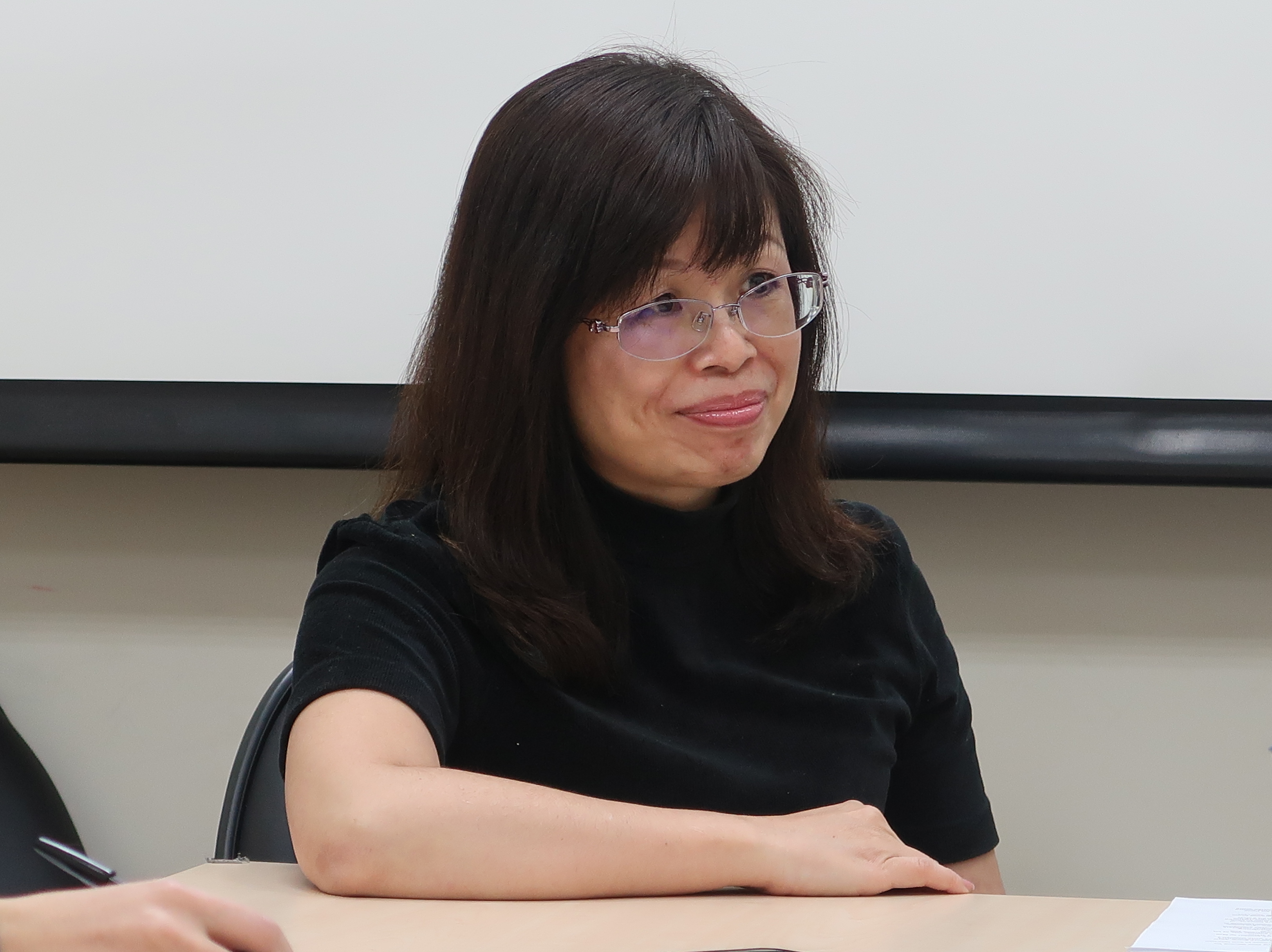
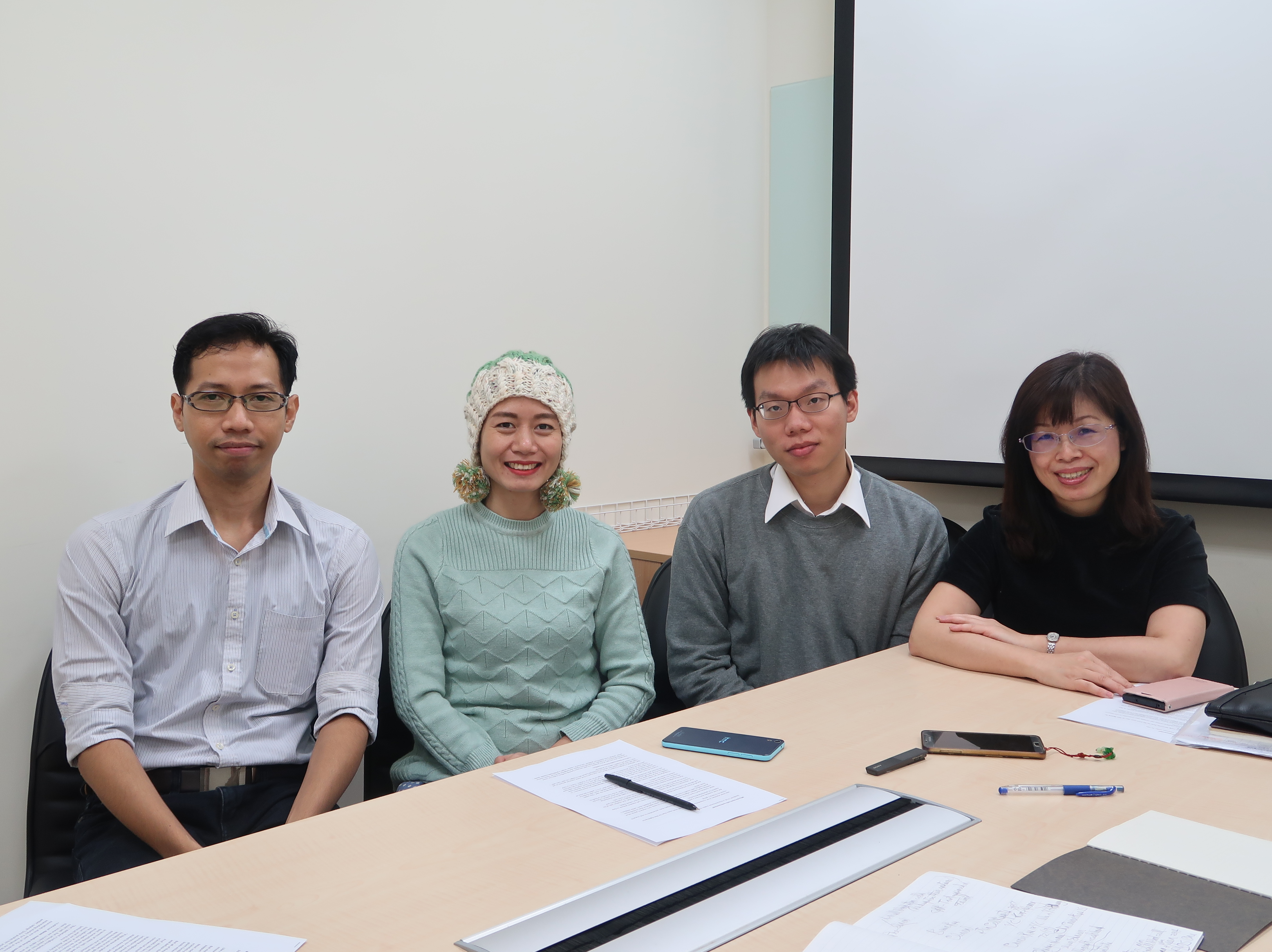
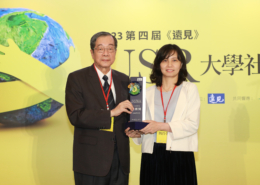
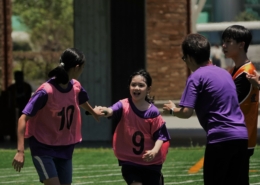
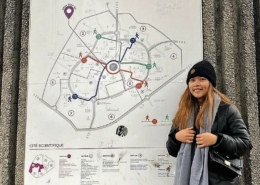

期許永續發展成為醫療產業新契機。-260x185.jpg)
